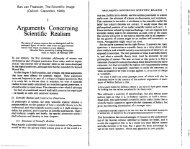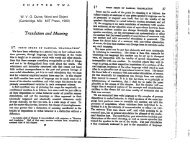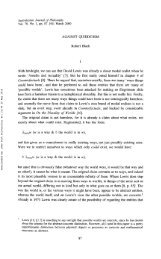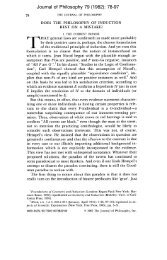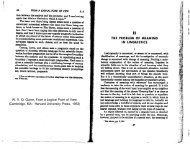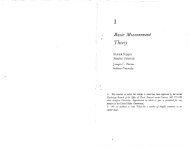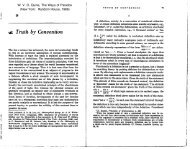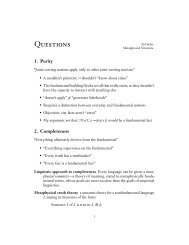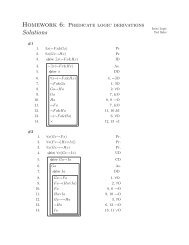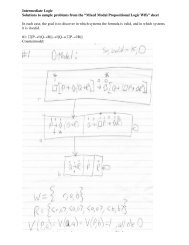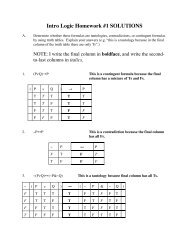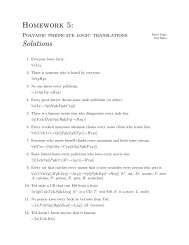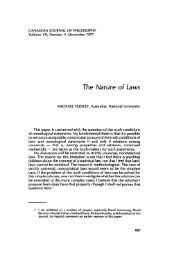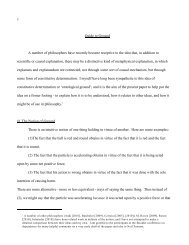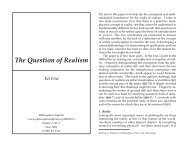Dummett - Wittgenstein's Philosophy of Mathematics.pdf - Ted Sider
Dummett - Wittgenstein's Philosophy of Mathematics.pdf - Ted Sider
Dummett - Wittgenstein's Philosophy of Mathematics.pdf - Ted Sider
Create successful ePaper yourself
Turn your PDF publications into a flip-book with our unique Google optimized e-Paper software.
MICHAEL DUMMETT<br />
schools as rivals, there remains the philosophical problem <strong>of</strong><br />
deciding which <strong>of</strong> the various accounts is correct. <strong>Wittgenstein's</strong><br />
book is intended as a contribution to the latter task only. It seems<br />
natural to suppose that the philosophical task and the mathe-<br />
matical go hand in hand, for the precise formulation <strong>of</strong> a con-<br />
ception is not irrelevant to deciding on its correctness, and<br />
unexpected consequences <strong>of</strong> adopting it may lead one to revise<br />
one's opinion as to its value. Wittgenstein will have none <strong>of</strong> this:<br />
for him philosophy and mathematics have nothing to say to one<br />
another; no mathematical discovery can have any bearing on<br />
the philosophy <strong>of</strong> mathematics.2 It would seem that he is theoreti-<br />
cally committed also to the converse, that no philosophical opinion<br />
could, or at least ought to, affect the procedure <strong>of</strong> the mathe-<br />
matician. This comes out to some extent in his discussion <strong>of</strong> the<br />
law <strong>of</strong> excluded middle in mathematics. Against one who insisted<br />
that either the sequence "77777" occurs in the development <strong>of</strong><br />
r or it does not, he employs arguments similar to those <strong>of</strong> the<br />
intuitionists; and yet it appears that he is not wishing to question<br />
the validity in a mathematical pro<strong>of</strong> <strong>of</strong>, for example, argument<br />
by cases, but only to reprove someone who in the course <strong>of</strong><br />
philosophical reflection wishes to insist on the law <strong>of</strong> excluded<br />
middle.3 Yet this is not to be taken too seriously, for Wittgenstein<br />
would always be able to claim that, while he had not shown<br />
that certain mathematical procedures were wrong, still he had<br />
shown them not to have the interest we were inclined to attach<br />
to them. Certainly in his discussion <strong>of</strong> Cantor he displays no<br />
timidity about "interfering with the mathematicians."4 I think<br />
that there is no ground for <strong>Wittgenstein's</strong> segregation <strong>of</strong> philos-<br />
ophy from mathematics but that this springs only from a general<br />
tendency <strong>of</strong> his to regard discourse as split up into a number<br />
<strong>of</strong> distinct islands with no communication between them (state-<br />
ments <strong>of</strong> natural science, <strong>of</strong> philosophy, <strong>of</strong> mathematics, <strong>of</strong><br />
religion).<br />
As Frege showed, the nominalist objection to Platonism-that<br />
talk about "abstract entities" is unintelligible-is ill-taken; if we<br />
2 Cf. V, 13, 19; IV, 52; also Investigations, II, xiv; I, 124.<br />
3 IV, 10.<br />
4 I, App. I I.<br />
326



